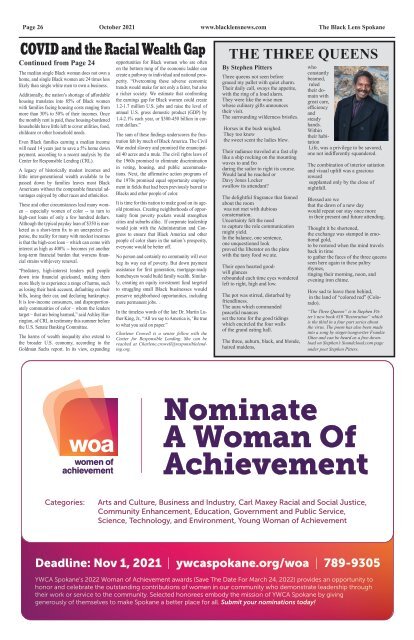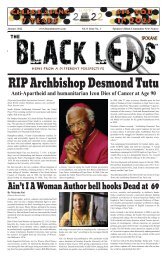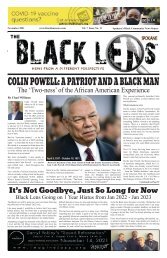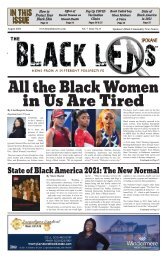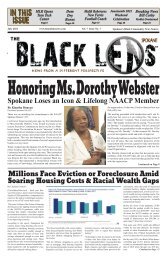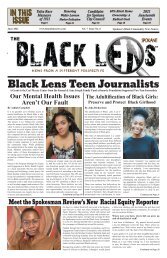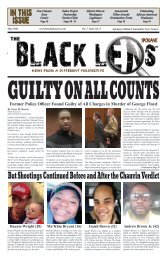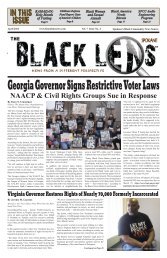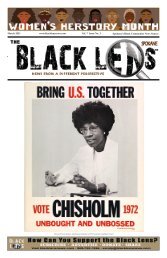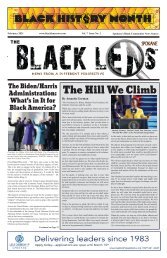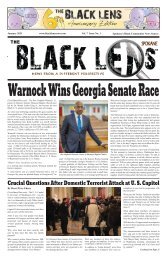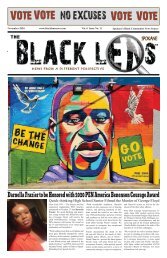Black Lens - October 2021
The Black Lens in an independent , community newspaper, published monthly and based in Spokane, WA, that covers then news, people, information and issues that are of importance to the Black community.
The Black Lens in an independent , community newspaper, published monthly and based in Spokane, WA, that covers then news, people, information and issues that are of importance to the Black community.
Create successful ePaper yourself
Turn your PDF publications into a flip-book with our unique Google optimized e-Paper software.
Page 26<br />
<strong>October</strong> <strong>2021</strong><br />
www.blacklensnews.com<br />
The <strong>Black</strong> <strong>Lens</strong> Spokane<br />
COVID and the Racial Wealth Gap<br />
Continued from Page 24<br />
The median single <strong>Black</strong> woman does not own a<br />
home, and single <strong>Black</strong> women are 24 times less<br />
likely than single white men to own a business.<br />
Additionally, the nation’s shortage of affordable<br />
housing translates into 85% of <strong>Black</strong> women<br />
with families facing housing costs ranging from<br />
more than 30% to 50% of their incomes. Once<br />
the monthly rent is paid, these housing-burdened<br />
households have little left to cover utilities, food,<br />
childcare or other household needs.<br />
Even <strong>Black</strong> families earning a median income<br />
will need 14 years just to save a 5% home down<br />
payment, according to a recent analysis by the<br />
Center for Responsible Lending (CRL).<br />
A legacy of historically modest incomes and<br />
little inter-generational wealth available to be<br />
passed down by families leaves most <strong>Black</strong><br />
Americans without the comparable financial advantages<br />
enjoyed by other races and ethnicities.<br />
These and other circumstances lead many women<br />
– especially women of color -- to turn to<br />
high-cost loans of only a few hundred dollars.<br />
Although the typical payday loan of $350 is marketed<br />
as a short-term fix to an unexpected expense,<br />
the reality for many with modest incomes<br />
is that the high-cost loan – which can come with<br />
interest as high as 400% -- becomes yet another<br />
long-term financial burden that worsens financial<br />
strains with[every renewal.<br />
“Predatory, high-interest lenders pull people<br />
down into financial quicksand, making them<br />
more likely to experience a range of harms, such<br />
as losing their bank account, defaulting on their<br />
bills, losing their car, and declaring bankruptcy.<br />
It is low-income consumers, and disproportionately<br />
communities of color – whom the lenders<br />
target – that are being harmed,” said Ashley Harrington,<br />
of CRL in testimony this summer before<br />
the U.S. Senate Banking Committee.<br />
The harms of wealth inequality also extend to<br />
the broader U.S. economy, according to the<br />
Goldman Sachs report. In its view, expanding<br />
opportunities for <strong>Black</strong> women who are often<br />
on the bottom rung of the economic ladder can<br />
create a pathway to individual and national prosperity.<br />
“Overcoming these adverse economic<br />
trends would make for not only a fairer, but also<br />
a richer society. We estimate that confronting<br />
the earnings gap for <strong>Black</strong> women could create<br />
1.2-1.7 million U.S. jobs and raise the level of<br />
annual U.S. gross domestic product (GDP) by<br />
1.4-2.1% each year, or $300-450 billion in current<br />
dollars.”<br />
The sum of these findings underscores the frustration<br />
felt by much of <strong>Black</strong> America. The Civil<br />
War ended slavery and promised the emancipated<br />
40 acres and a mule. The civil rights laws of<br />
the 1960s promised to eliminate discrimination<br />
in voting, housing, and public accommodations.<br />
Next, the affirmative action programs of<br />
the 1970s promised equal opportunity employment<br />
in fields that had been previously barred to<br />
<strong>Black</strong>s and other people of color.<br />
It is time for this nation to make good on its ageold<br />
promises. Creating neighborhoods of opportunity<br />
from poverty pockets would strengthen<br />
cities and suburbs alike. If corporate leadership<br />
would join with the Administration and Congress<br />
to ensure that <strong>Black</strong> America and other<br />
people of color share in the nation’s prosperity,<br />
everyone would be better off.<br />
No person and certainly no community will ever<br />
beg its way out of poverty. But down payment<br />
assistance for first generation, mortgage-ready<br />
homebuyers would build family wealth. Similarly,<br />
creating an equity investment fund targeted<br />
to struggling small <strong>Black</strong> businesses would<br />
preserve neighborhood opportunities, including<br />
more permanent jobs. .<br />
In the timeless words of the late Dr. Martin Luther<br />
King, Jr., “All we say to America is, ‘Be true<br />
to what you said on paper.”<br />
Charlene Crowell is a senior fellow with the<br />
Center for Responsible Lending. She can be<br />
reached at Charlene.crowell@responsiblelending.org.<br />
THE THREE QUEENS<br />
By Stephen Pitters<br />
Three queens not seen before<br />
graced my pallet with quiet charm.<br />
Their daily call, sways the appetite,<br />
with the ring of a loud alarm.<br />
They were like the wise men<br />
whose culinary gifts announces<br />
their visit.<br />
The surrounding wilderness bristles.<br />
Horses in the bush neighed.<br />
They too knew<br />
the sweet scent the ladies blew.<br />
Their radiance traveled at a fast clip<br />
like a ship rocking on the mounting<br />
waves to and fro<br />
daring the sailor to right its course.<br />
Would land be reached or<br />
Davy Jones Locker<br />
swallow its attendant?<br />
The delightful fragrance that fanned<br />
about the room<br />
was not met with dubious<br />
consternation.<br />
Uncertainty felt the need<br />
to capture the role communication<br />
might yield.<br />
In the balance, one sentence,<br />
one unquestioned look<br />
proved the liberator on the plate<br />
with the tasty food we ate.<br />
Their open hearted goodwill<br />
glances<br />
rebounded each time eyes wondered<br />
left to right, high and low.<br />
The pot was stirred, disturbed by<br />
friendliness.<br />
The aura which commanded<br />
peaceful nuances<br />
set the tone for the good tidings<br />
which encircled the four walls<br />
of the grand eating hall.<br />
The three, auburn, black, and blonde,<br />
haired maidens,<br />
who<br />
constantly<br />
beamed,<br />
ruled<br />
their domain<br />
with<br />
great care,<br />
efficiency<br />
and<br />
steady<br />
hands.<br />
Within<br />
their habitation<br />
Life, was a privilege to be savored,<br />
one not indifferently squandered.<br />
The combination of interior satiation<br />
and visual uplift was a gracious<br />
reward<br />
supplanted only by the close of<br />
nightfall.<br />
Blessed are we<br />
that the dawn of a new day<br />
would repeat our stay once more<br />
in their present and future attending.<br />
Thought it be shortened,<br />
the exchange was stamped in emotional<br />
gold,<br />
to be restored when the mind travels<br />
back in time<br />
to gather the faces of the three queens<br />
seen here again in these paltry<br />
rhymes,<br />
ringing their morning, noon, and<br />
evening iron chime.<br />
How sad to leave them behind,<br />
in the land of “colored red” (Colorado).<br />
“The Three Queens” is in Stephen Pitter’s<br />
new book #10”Restoration” which<br />
is the third in a four part series about<br />
the virus. The poem has also been made<br />
into a song by singer/songwriter Frankie<br />
Ghee and can be heard as a free download<br />
on Stephen’s Soundcloud.com page<br />
under poet Stephen Pitters.<br />
Nominate<br />
A Woman Of<br />
Achievement<br />
Categories:<br />
Arts and Culture, Business and Industry, Carl Maxey Racial and Social Justice,<br />
Community Enhancement, Education, Government and Public Service,<br />
Science, Technology, and Environment, Young Woman of Achievement<br />
Deadline: Nov 1, <strong>2021</strong> | ywcaspokane.org/woa | 789-9305<br />
YWCA Spokane’s 2022 Woman of Achievement awards (Save The Date For March 24, 2022) provides an opportunity to<br />
honor and celebrate the outstanding contributions of women in our community who demonstrate leadership through<br />
their work or service to the community. Selected honorees embody the mission of YWCA Spokane by giving<br />
generously of themselves to make Spokane a better place for all. Submit your nominations today!


